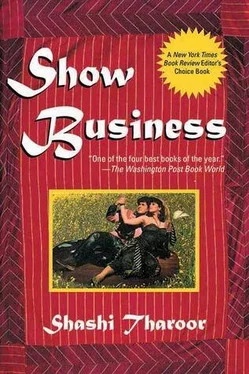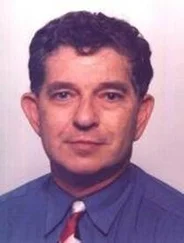I don’t suppose you could really understand that, because I don’t imagine you’ve felt anything for any woman beyond the desire to possess her. You must have agonized over whether you were the first to possess Maya, or whether I, insignificant villain that I was, had beaten you to it. Let me put you out of your misery. I hadn’t. Maya would not have slept with someone she didn’t love, and at that time she didn’t love me.
I’m saying this to help you come to terms with what I’m going to tell you now. In the last few years Maya was tormented by your treatment of her, torn between her duty to you and the triplets on the one hand and her need for love on the other. She thought she could find consolation in conversation with me, but it was soon obvious I had much more than my silences to offer her. Before she made that leap of faith she gave you so many chances, Ashok, to claim her back. You never seized any of them. One small gesture from you would have been enough, one sign that she mattered, that her loyalty was reciprocated by your love. You didn’t bother. In the end you whittled away her resistance with your indifference as surely as I did by my sheer constancy.
And so it happened. We loved, and we loved while unable to acknowledge our love. The fact that I gave her my love made her, ironically, a better wife to you: not out of guilt so much as because she was fulfilled in a way she had not been before and could turn to the other things you wanted out of her without the emptiness and bitterness she had choked on before. She became a diligent daughter-in-law, a dedicated mother, a loyal political wife on the campaign trail. And from wherever she was, she always returned from her duty with you to Bombay, and to me.
As long as you survive, Ashok, in any condition, she will never leave you. I don’t think you’ll survive, but if you do, I won’t mind. I have what I want, which is more than I had dared hope for.
And yes, I suppose you should know, though a husband less self-obsessed than you would have guessed it a long time ago. Aashish is not a Banjara. For in the course of discovering her love, Maya, our Maya, bore you my son.
KULBHUSHAN BANJARA
My son. My son, I cannot bear to see you lying there, bandaged and still, the life ebbing out of you. Why did this have to happen, Ashok? I expected one day to have you come and light my pyre, send my soul to another world. I cannot, I will not, imagine you going there before me.
There is so much to say, my son. So much I should have said earlier, before all this. But you would not have listened. And I was too proud to speak. That is what came between us, my pride and yours.
I will not make the mistake of lecturing you again. I–I’m sorry. The words do not come out easily, Ashok. They trip over lumps I did not know I had in my throat. They hurt.
You hurt me, but I took too long to realize how much I had hurt you too. Why could we never talk directly about these things, about our expectations, hopes, fears? You never saw beyond my disapproval, and I never looked beyond your resentment. Even though my disapproval has always turned out to be justified, because every time I disapproved of something you did it was for your sake. I knew it would be wrong for you, that it would hurt you. When you entered politics, how bitter you were about my disapproval! And yet I knew from the first day that the way it was happening, the way you were going into it, you were doomed to failure. Even I could not predict the scale of the disaster that would overtake you. But you would not listen, my son. You never did.
Ashok, stay on. Fight this — whatever this is that is taking its toll on you. Come back, and make a fresh start. You have all of us with you, and so many friends and well-wishers from the film industry, even the political world. And of course you have the people, the great ordinary masses of India. They all, we all, love you, Ashok. Come back to us. Don’t give up.
That friend of yours, that fine young man, Pranay, was telling us what this trag this accident has revealed about the place of films in our country. The experts, he says, were all predicting that as in other countries, television and video would sound the death knell of the film industry; that once people had alternative sources of entertainment, they wouldn’t turn to the cinema any more. There were visions of theaters closing down, film people being thrown out of work, stars reduced to the twenty-inch mediocrity of the TV screen. It hasn’t happened. And it hasn’t happened, Pranay says, because, in addition to the economic realities that restrict the number of people who can have access to TV and video, the magic of the cinema has not faded in India. This is something that the vast, nationwide outpouring of grief and support for you has proved again, beyond doubt.
Ashok, my son, there are rickshawallahs who have walked hundreds of miles to be by your side, beggars who have given their pitiful alms to temples in offerings for your recovery, housewives who have refused to eat until you are discharged from the hospital. You have incarnated the hopes and dreams of all these people and of all India. You cannot let them down now.
And you cannot leave me, Ashok. In all these years, I have made my disapproval clear, but I have not directly asked you for anything. I am asking you now, Ashok. Do not go away from me, my son. Let me take you in my arms and ask for your forgiveness.
I… I’ve said it at last. Forgive me, Ashok, for everything. For the lectures. For the disapproval. For the sin of always having been right, and of having known it, and of having shown I know it. Forgive me, Ashok, and come back to me. I want to hear you call me “Dad” again.
Ashok … my son … I can’t go on.
ASHWIN
I have a message for you, Ashok-bhai. The Guruji rang. You remember him, from the election? He’s here now, a sort of resident seer to the stars. I had no idea you had maintained contact with him, but then I have no idea about lots of things involving you. I told him there was no indication you’d be able to hear or understand what anyone had to say. He said, “He’ll understand.” So I’ll read you his message.
It’s in Sanskrit, a verse from the Valmiki Ramayana:
dharmadarthaha prabhavati
dharmath prabhavate sukham,
dharmen labhate saw am,
dharma saarabinda jagat.
Hope I’ve said it right. The Guruji also supplied a translation: “From dharma comes success, from dharma comes happiness, everything emerges from dharma, dharma is the essence of the world.”
Is that all? I asked him. Is that the message? And he said, “Tell him that dharma is what life is all about, the upholding of the natural order. Tell him that whatever he did was in fulfillment of his dharma. Tell him to have no regrets.”
I’m passing it on, Ashok-bhai, but for what it’s worth, I think it’s too easy. One has to have regrets. I have regrets. A life without regrets is a life lived without introspection, without inquiry. That’s not a life worth living.
MAYA
It’s too late, Ashok. There was so much to say, so much I wanted to tell you, so much you never had time to listen to. Now I see you lying there, and I have no words for you anymore. You wrote me out of your script, Ashok. You left me nothing to say.

Interior: Night / Day
I can’t believe I’m doing this.
Me, Ashok Banjara, best-educated actor in the Hindi film world, former member of Parliament, man of action who gave both “man” and “action” new definitions, Bollywood’s first megastar and most articulate of interviewees, lying in a hospital bed festooned in tubes and drips and bandages, listening to the hate and frustration and regret of a motley cast of characters from my life. But it is me, it’s my ears that are taking in this drivel, it’s my lips that refuse to move in response to my command, it’s my tongue that does not so much as flicker when I painfully demand of it the shout that will deliver me from these voices. What is the matter with me? The doctors of Bombay’s best hospital do not know. What is going to happen to me? Who tampered with the script?
Читать дальше













